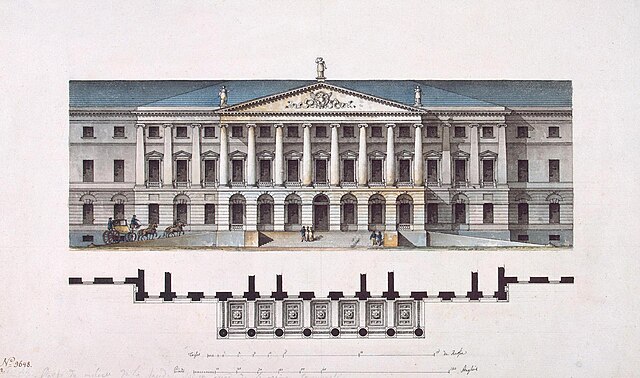Ivan Ivanovich Shuvalov was called the Maecenas (patron) of the Russian Enlightenment, the first Russian Minister of Education and Active Privy Councillor (1773). Russia's first theatre, university, and academy of arts were instituted with his active participation. A favorite of Elizaveta Petrovna of Russia; friend of the scientist M.V. Lomonosov.
Ivan Shuvalov in 1760, as painted by F. Rokotov A variation of L. Tokke's composition Canvas, oil. 68.6 × 54.2 cm Hermitage Museum, St. Petersburg
Ivan Shuvalov by Anton Losenko
View of Ivan Shuvalov's art gallery.
The Russian Age of Enlightenment was a period in the 18th century in which the government began to actively encourage the proliferation of arts and sciences, which had a profound impact on Russian culture. During this time, the first Russian university was founded, a library, a theatre, a public museum, as well as relatively independent press. Like other enlightened despots, Catherine the Great played a key role in fostering the arts, sciences, and education.
The national Enlightenment in the Russian Empire differed from its Western European counterpart in that it promoted further modernization of all aspects of Russian life and was concerned with abolishing the institution of serfdom in Russia. Russian Enlightenment didn't promote any changes for separation of church and state. Pugachev's Rebellion and the French Revolution may have shattered the illusions of rapid political change, but the intellectual climate in Russia was altered irrevocably. Russia's place in the world was debated by Denis Fonvizin, Mikhail Shcherbatov, Andrey Bolotov, Alexander Radishchev, and Ivan Boltin; these discussions precipitated the divide between the radical, western, conservative and Slavophile traditions of Russian thought. Intellectuals often used the term prosveshchenie, promoting piety, erudition, and commitment to the spread of learning.

Mikeshin's Monument to Catherine the Great after the Alexandrine Theatre in St. Petersburg
View of Ivan Shuvalov's art gallery
Quarenghi's design for the Smolny Institute
Parasha Zhemchugova, a serf actress-turned-countess.






